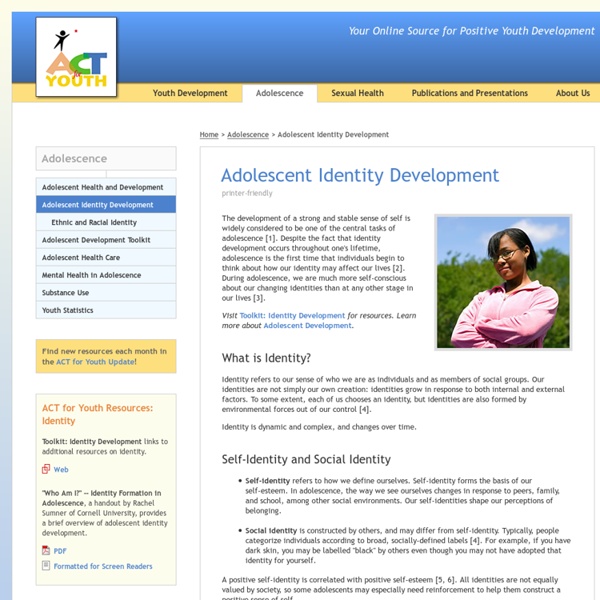How Parents Can Help Their Teenager Form a Positive Self-Identity
Though it can be hard for parents to let go and acknowledge their teen needs external help, a credible adventure therapy program can relatively quickly and positively change your son or daughter’s life for the better. Psychologist Erik Erikson advocated that teen identity development is fostered by experiences that allow individuals to express their individuality and receive feedback and validation from others. Adventure therapy programs provide experiences that promote healthier relationships and positive identity formation in teens. A credible adventure therapy program can also positively affect a teen’s self-perception, confidence, and leadership skills by providing unique experiences and challenging opportunities that develop competence and confidence from within.
James Marcia's Identity Theory: Understanding Adolescents' Search For Identity
Videos, quizzes & homework help Watch 5 minute video clips, get step by step explanations, take practice quizzes and tests to master any topic. Did you know? Study.com has a library of 550,000 questions and answers for covering your toughest textbook problems Students love Study.com I love the way expert tutors clearly explains the answers to my homework questions.
Adolescent Identity Development: What to Expect in Teens
Adolescent Identity Development: The Factors of Change Among the profound and exciting changes taking place in adolescence is the process of self-discovery. Our teens are working to figure out who they are, making adolescent identity development a central feature of teen life. Young people’s identities are shaped by lots of factors — family, cultural and societal expectations, experiences with institutions like school and the media, and friends. Young people also take active steps and make choices that shape their identity. They select the environments and people they want to be around.
Identity Development Theory
Identity Development Theory A well-developed identity is comprised of goals, values, and beliefs to which a person is committed. It is the awareness of the consistency in self over time, the recognition of this consistency by others (Erikson, 1980). The process of identity development is both an individual and social phenomenon (Adams & Marshall, 1996).
Stages of Adolescence
By: Brittany Allen, MD, FAAP & Helen Waterman, DO Adolescence is the period of transition between childhood and adulthood. It includes some big changes—to the body, and to the way a young person relates to the world.
Identity Formation in Adolescence
by Rachel Sumner, PhD Cornell University www.actforyouth.net/adolescence/identity/ (Note: This page is formatted for screen readers. See the PDF for an alternate format/handout.)
For Our White Friends Desiring to Be Allies
Author's Note: I'm writing this in hopes that it can be used to lighten the load of marginalized folks, keeping in mind that not all marginalized people want to engage in the ally conversation, and that is perfect as well. For those who do, my prayer is that when someone asks you the question, “how can I be a stronger ally?” you might choose to save your breath/energy and send this in its place. I have been asked by two dear friends, “how can I be a stronger ally?”
Social media affects teens’ self-esteem, personal identity
Almost all teens love social media such as, Twitter, Instagram, Facebook, Tumblr, Youtube, Vine, etc. What teens don’t see is how much of an impact it has on their self-esteem. In today’s social networking, teens are worried about how many “likes” they can get, how many followers they gain and how many retweets they have, even though none of it matters. “Social media creates an environment where disordered thoughts and behaviors really thrive,” The Dove Self-Esteem Project says. Frankly, it’s getting even worse considering the negative effects of social networking are already impacting the generations before us. Without a lot of “likes,” followers, or retweets, teens see themselves as “not good enough.”
What Is Self-Concept and How Does It Form?
Self-concept is the image that we have of ourselves. How exactly does this self-image form and change over time? This image develops in a number of ways but is particularly influenced by our interactions with important people in our lives.
Erikson’s 8 Stages of Psychosocial Development
Erik Erikson (1902–1994) was a stage theorist who took Freud’s controversial theory of psychosexual development and modified it as a psychosocial theory. Erikson emphasized that the ego makes positive contributions to development by mastering attitudes, ideas, and skills at each stage of development. This mastery helps children grow into successful, contributing members of society. During each of Erikson’s eight stages, there is a psychological conflict that must be successfully overcome in order for a child to develop into a healthy, well-adjusted adult. Erik Erikson Erikson developed his eight stages of psychosocial development based on Freud’s psychosexual theory.



